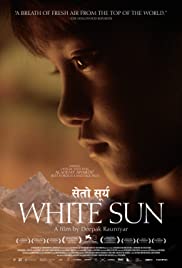
WHITE SUN/ SETO SURYA
Nepal, 2016, 89 minutes, Colour.
Dayahang Rai, Asha Maya Magrati.
Directed by Deepak Rauniyar.
The great many films which come from Nepal. This film is a welcome addition.
The setting is contemporary, especially from the 1990s on with revolutionaries in the country, basing themselves on Chairman Mao, called Maoists, who are rebelling against the centuries-old monarchy and the ritual traditions. This has led to Civil War, divisions in families and communities, many deaths.
The opening of this film, the mayor of the village, an old man, dies. The locals try to give him a ritual funeral but he has died upstairs, cannot be carried downstairs to exit as required by the front door, so attempts are made to lower him from a window. These are frustrated as well.
One of his sons is the able-bodied person in the village. The old man has been cared for by his daughter-in-law and her daughter, faithful to the old man, but incurring some anger because, against ritual, she touches his dead body, trying to be practical.
She has let the old man’s other son know about the death. He has been a revolutionary, prominent amongst the Maoists, now retired but wounded in war. He travels to the village by bus, encountering children in the square and a young orphan latching himself to the soldier, accompanying him to the village.
While they get the body down to the ground, it is a difficult trek to take the body to the river, the two sons, barefooted, going down rocks and slopes, managing the body but eventually coming to ideological blows and dropping the corpse. The loyal son who remained walks away.
This means that the Maoist has to find a solution, walks to a nearby police station but they are unwilling to help, hears of a wedding reception where his former commander will be present, the commander explaining that he is still a Maoist and in the government but his son wanted a ritual wedding. He does not help either.
In the meantime, the little girl thinks that the Maoist is her father, but he is not. Her mother wants a signature of parent responsibility for the further education of her daughter.
The film has an ironic ending, the adults squabbling about the body and carrying it, the priest making ritual demands and disapproving of the Maoist – but in the meantime, the children carry the body down to the river bank and are building a pyre for it to be burnt. The symbol of hope for the future with the next generation working together in a way that their parents did not.
1. A film from Nepal, its quality?
2. The history of government in Nepal, the long tradition of the monarchy, the establishment of caste, the 20th century and into the 21st-century with the revolutionaries, the Maoists, Civil War? Resistance to the revolutionaries and the value of holding onto traditions?
3. The locations, the city and the bus station, the countryside, the bus travel, the village, homes, the death and the rites, the family and the elders, the mountains, rivers, bridges, neighbouring villages? The atmosphere? The musical score?
4. The village, the death of the old man upstairs, his being the mayor, strong on traditions, his two sons, his daughter-in-law caring for him? Her daughter and the devotion to the grandfather? The men unable to get the body out the ritual front door, trying to get the body out of the window, second story? Unable? His son Suraj and the attempts, but the old men not strong enough? Stranded?
5. The focus on Chandra, his background as a Maoist, retired soldier, wounds? Getting the bus, travelling to see his father? Arriving, the children in the square, the young boy and his begging, walking with him up the mountain, carrying some of the cases? The boy relishing the guns, Chandra’s showing his wound? The past history with Durga, Pooja thinking he might be her father? The boy claiming to be his son? The truth, Chandra not being the girl’s father? The attempted the window, getting the body out, lifting it down? Durga touching the body and the reaction against this? Carrying the body to the river, the long trek, difficult, the men with no shoes, the rocks, the slopes? Finally the arguments, political, dropping the body, Suraj and his leaving?
6. Chandra, going to see the police to get help, the children following? The bridge down, the levy across the river, the children following despite Pooja’s disconnecting the levy? The police, the discussions, unwilling to help? Going to the wedding party, the past commander, arriving by helicopter, wealthy, the ritual and the traditions of the wedding, his pompous reaction, unwilling to?
7. The boy, his reaction to Chandra as a Maoist, stating that he killed his parents, his rage against Chandra?
8. Chandra and Durga talking, needing the signature for her daughter’s enrolment for further education? Deciding to marry Suraj, mainly to get the signature? His anger against her?
9. The revolutionaries arriving, the squad loyal to the traditions, arguments, shots, wounds?
10. The body moved by the children while the adults were arguing, reenacting the Civil War? Their building the funeral pyre?
11. Images of politics and clash in Nepal, adults arguing, children combining – and some hope for the future?